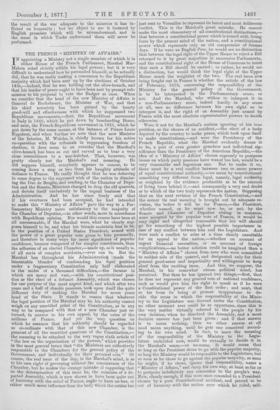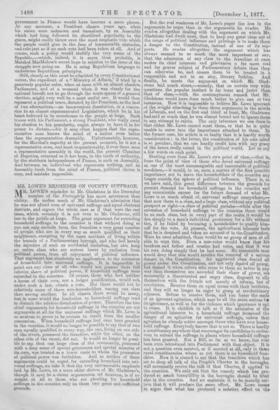THE FRENCH "MINISTRY OF AFFAIRS."
IN appointing a Ministry not a single member of which is in 1. either House of the French Parliament, Marshal Mac- Mahon acted strictly within his legal powers ; but it is very difficult to understand how he persuaded himself, as he actually did, that he was really making a concession to the Republican majority which had been sent up by the elections of October 14th,—indeed, that he was holding out the olive-branch, and that hie tender of peace ought to have been met by prompt sub- mission to his proposal to vote the Budget at once. When we consider that the head of the new Ministry of Affairs is General de Rod ebouet, the Minister of War, and that his chief notoriety has been gained by the hearty good-will and effectiveness with which he suppressed two Republican movements,—first, the Republican movement in Italy in 1849, which he put down by bombarding Rome, and next, the French Republican movement in 1851, which he put down by the same means, at the instance of Prince Louis Napoleon, and when further we note that the new Minister of the Interior, M. Welche, is chiefly known for his active co-operation with the tribunals in suppressing freedom of election, it does seem to an outsider that the Marshal's olive-branch has been so cut and carved as to bear a very close resemblance to a war-hatchet. That, however, was pretty clearly not the Marshal's real meaning. He did suppose himself, everybody appears to concur, to be coming down a step or two from his haughty attitude of defiance to France. He really thought that he was deferring in some degree to the expressed wish of the nation in dismiss- ing the Due de Broglie, and sending, to the Chamber of Depu- ties and the Senate, Ministers charged to drop the old quarrels, and devote itself exclusively to the urgent business of the Administration. And he has since freely said that if his overtures had been accepted, he had intended to make this "Ministry of Affairs" pave the way to a Par- liamentary Ministry more satisfactory to the majority of the Chamber of Deputies,—in other words, more in accordance with Republican opinion. Nor would this course have been at all unreasonable, if the Marshal were, what he clearly sup- poses himself to be and what his friends maintain him to be, in the position of a United States President, armed with the power of a great popular vote given to him personally, and therefore in many ways far more significant of popular confidence, because composed of far simpler constituents, than the adhesion of an elected Chamber,—made up, as it usually is, of all sorts of complex accidents,—ever can be. But the Marshal has throughout his Administration made the lamentable blunder of confounding his legal position under a fragmentary Constitution only half elaborated in the midst of a thousand difficulties,—the lacunae in which are many and vast,—with his constitutional posi- tion as the elect of a defunct Assembly, which was chosen for one purpose of the most urgent kind, and which after two years and a half of chaotic passions, took upon itself the quite different duty of making the Marshal for seven years head of the State. It stands to reason that whatever the legal position of the Marshal may be, his authority cannot weigh on any unsettled point of the Constitution, as in any way to be compared with that of a new Chamber just re- turned, in answer to his own appeal, by the votes of the millions of France. And yet the very question on which he assumes that his authority should be regarded as co-ordinate with that of this new Chamber, is the greatest of all the unsettled questions of the Constitution,— the meaning to be attached to the very vague sixth article of "the law on the organisation of the powers," which provides in the most general terms that "the Ministers are collectively responsible to the Chambers for the general policy of the Government, and individually for their personal acts." Of course, the real issue of the day, in the Marshal's mind, is as to his own right of governing without the concurrence of the Chamber, but he makes the strange mistake of supposing that in the determination of this issue he, the nominee of a de- parted Assembly, which is now shown to have been quite out of harmony with the mind of France, ought to have no less, or rather much more influence than the body which the nation has just sent to Versailles to represent its latest and most deliberate verdict. This is the Marshal's great mistake. He cannot make the most elementary of all constitutional distinctions,— that between a constitutional power which is armed with living force by the present mind of the nation, and a constitutional power which represents only an old compromise of former days. If he were an English Peer, he would see no distinction that between the legal right of the Upper House to reject a Bill returned to it by great majorities in successive Parliaments, and the constitutional right of the House of Commons to insist that such a Bill should be carried ; or rather, he would see a distinction, but would think the legal right of the Upper House much the weightier of the two. The real issue now being fought out in France is whether the article of the law of February, 1875, concerning the responsibility of the Ministry for the general policy of the Government, is to be interpreted in the Parliamentary sense, or not. And the Marshal, who wishes to interpret it in a non-Parliamentary sense, indeed hardly in any sense at all, sees no difference between his own tight so to interpret it, and the right of an Assembly just armed by France with the most absolute representative powers to decide otherwise.
Were it not for the Marshal's curious ignoring of his true position, as the chosen of an accident,—the elect of a body deputed by the country to make peace, which took upon itself to make constitutions,—and were the Presidency of the French Republic, what the Marshal evidently deems it to be, a post of even greater grandeur and individual sig- nificance than the Presidency of the American Republic,—the idea of a Ministry of Affairs' chosen expressly to postpone issues on which party passions have waxed too hot, would be a very reasonable and ingenious one. But to make it so, there must be a real conflict between two or, more powers of equal constitutional authority,—we mean by constitutional something very different from legal, namely, legal authority as weighted by the evidence producible as to the amount of living force behind it,—and consequently a very real doubt as to which of the two truly represents the nation. Supposing that on the next revision of the French Constitution,—and the sooner its real meaning is brought out by adequate re- vision, the better it will be for France,—the President, whether named, as lie must now be, or not, by the Senate and Chamber of Deputies sitting In common, were accepted by the popular vote of France, it would be very right and altogether reasonable that his will should go for something of the highest possible importance in case of any conflict between him and the Legislature. And. were such a conflict to arise at a time clearly unsuitable. for an appeal to the nation,—whether on account of urgent financial necessities, or on account of foreign complications,—no better solution could be imagined than a "Ministry of Affairs" chosen from men who were committed to neither side of the quarrel, and designated only for their general good-sense and impartiality and willingness to keep aloof from the exciting issue. And this, we suppose, the Marshal, in his somewhat obtuse political mind, has perceived. But then he has ignored two things,—first, that he does not represent any general vote of national confidence, such as would give him the right to speak as if he were a Constitutional power of the first order ; and next, that so far from its being at present inopportune to de- cide the sense in which the responsibility of the Minis- try to the Legislature was decreed under the Constitution, no other moment ever could be so opportune, since this is the very matter virtually referred to the people by his own decision, when he dissolved the Assembly, and a most decisive answer has just been given ; and if that answer is to mean nothing, then no other answer at all need mean anything, until he gets one conceived accord- ing to his own mind. In fact, to leave the meaning of the responsibility of the Ministry to the Legis- lature undecided now, would be virtually to decide it in the Marshal's sense,—or no-sense. It would mean. that so long as the President chose to go with the popular majority, so long the Ministry would be responsible to the Legislature, but so soon as he chose to go against the popular majority, so soon he might, if he chose, ignore that responsibility, name a "Ministry of Affairs," and carry his own way, at least so far as to postpone indefinitely any concession to the people's way. Now, clearly enough, if this were once conceded to a President chosen by a pure Constitutional accident, and proved to be out of harmony with the nation over which he ruled, self-
government in France would have become a mere phrase. At any moment, a President chosen years ago, when hie views were unknown and immature, by an Assembly which had long followed its shortlived popularity to the grave, might coolly throw over the most emphatic vote which the people could give in the face of innumerable obstacles, and rule just as if no such vote had been taken at all. And of course, such a policy would stultify the very name of the Republic,—which, indeed, it is more than probable, is Marshal MacMahon's secret hope in relation to the issue of the struggle now going on. He is using Republican language to undermine Republican principles. Still, clearly as this must be admitted by every Constitutional writer, the expedient of a "Ministry of Affairs," if tried by a genuinely popular ruler, when at issue with an almost obsolete Parliament, and at a moment when it was clearly for the national benefit not to go through the acute spasm of a general election, might very well be a most useful one. It would then represent a political truce, dictated by the President, as the best of two alternatives,—an inconvenient dissolution, or a conces- sion to an almost superannuated Legislature, which he in his heart believed to be unwelcome to the people at large. Such truces with his Parliament, a strong President, who really owed his election to his popularity, ought always to have it in his power to dictate,—for it may often happen that the repre- sentative man knows the mind of a nation even better than the representative Assembly. Unfortunately, however, for the Marshal's sagacity at the present moment, he is not a representative man, and most unquestionably, if ever there were a representative assembly in the world, the present Chamber of Deputies, returned as it has been, in the teeth of authority, by the stubborn independence of France, is such an Assembly. And between an individual who represents nothing, and an Assembly fresh from the mind of France, political choice is easy, and mistake impossible.







































 Previous page
Previous page